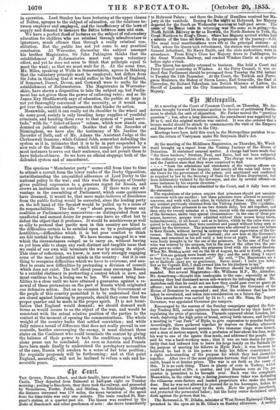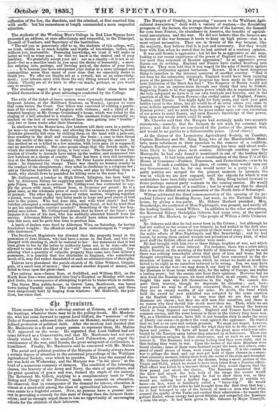b hp 3gt-txuvi1io.
At a meeting-of the Court of Common Council, on Thursday, Mr. An. derton brought forward his annualmotion in favour of petitioning Parlia- ment to abolish the oath of abjuration. Mr. Parker moved the "previous question" ; but, after -a long, discussion, the-amendment was negatived by 80 to 6,• and-the original motion was' carried.. It was also ordered that a bronze medal should be struck to commemorate-the visit of the Emperor and Empress of the French -to the 'City.
Meetings have been held this week in the Metropolitan parishes to se. oure the return of Vestrymen under Sir Benjamin Hall's Act.
At the meeting of the Middlesex Magistrates, on Thursday, Mr. Wood- ward brought up a report from -the Visiting Justices of the House of Detention. It contained unusual matter. A charge-had been made that " the three bankers," Strahan „Paul, and Bates, had not been subjected
to the ordinary regulations of prisen. The charge was investigated, and the Justices state that they were-surprised to find - - - - " from the admissions and -statements oT the various officers ex- amined in the course of the inquiry, that nearly all the rules laid down by the Court for the government of the prison, and sanctioned and confirmed as required bylaw by the Secretary of State for the Home Department, had been deliberately violated by the Governor, and also by several officers—in some instances by his express direction."
The whole evidence was submitted to the Court, and it fully bore out the statement.
The regulations of the prison require that prisoners should not associate or converse with one another : but these prisoners were allowed to associate converse, and walk with each other, in Violation of those rules, and wit),",T, any consent previously obtained from the Visiting Justices. Thel.rialatioa_ of•the prison allow prisoners to see two friends daily, but wit together, and then•only for twenty minutes at a time, except with the express permission of the Governor, under very special circumstances : in the ease of these pri- soners, however, persona were admitted without their names being taken, indiscriminately, at all hours ; and as to letters, which by the rules were re- quired to be examined, they were received and passed without being seen or opened by the Governor. The prisoners were also allowed to send out letters to their'friends, without having to undergo the usual supervision of-the Go- vernor. Mrs. Strahan visited her husband; she saw him at the Governor's house, and remained in his cell until a late hour at night. Wine and fruit were freely brought in for the use of the prisoners. In the case of Paul the wine was ordered by the surgeon, but in the case of the other two the sur- geon gave no order, /a short, the prisoners lived with the utmost freedom. When Mr. Btraban went out on the 2d of August, he said to Forth, a Avard- or—" You are gettigig more harsh every day ; and the next thing I expect to hear is to go into the common cell" He said, " The Magistrates are a 'set of Radicals they are no gentlemen. Never -mind; I leave you today. But as'for Captain Hill, I shall reward him for his kindness to me." Mr. Woodward moved that the Governor should be publicly repri- snanded. But several Magistrates—Mr. Williams M.P., Mr. Antrobus, Mr. -Armstrong—thought this inadequate to the case • especially as that morning they had dismissed seven sub-warders for infringing rules. Mr. Antrobus :said that he could not see how they could pass over so grave an offence; and he moved, as an amendment, "That the Governor of the House of Detention be suspended ; and that the evidence that has been taken be circulated, and taken into consideration on a future day."
This amendment was carried by 24 to 5 ; and Mr. Sims, the Deputy Governor, was appointed Governor, pro tempera.
Encouraged by the success of the Sunday campaigns against the Sun- day Trading Bil4 certain agitators have determined to try their hand in regulating the price of provisions. Placards appeared about London, last week, deploring the high price of bread, setting forth causes, and inviting a-meeting in "our Park" of Hyde, to give expression to popular feeling. Accordingly, there gathered together by degrees on Sunday afternoon some four or five thousand persons. Two immense rings were formed, and a man of serious aspect, with a profusion of hair about his face, made his way to one of the spaces thus made and addressed the people. He said he was a hard-working man ; that it was no vain desire for popu- larity that had induced him to leave his large family on the Sabbath for the purpose of meeting his fellows in Hyde Park ; it was because be believed he had it in his power to help his fellow countrymen to a right understanding of the purpose for which they had assembled together. After two of the most plenteous harvests that ever blessed the earth, bread is at famine prices. The war is set forth as the cause of this. It is no such thing. There is plenty of corn in Turkey, which could be imported at 208. a quarter, and yet Russian corn at 738. per quarter is permitted to be brought over. Such was the complaint. Meanwhile, in the other ring, a daring journeyman baker was defending the villanous corn-factors and landed proprietors who make the bread dear. But he was not allowed to proceed far in his harangue, before he was seized and hurried away by the mob. Here the police interfered, and protected the persecuted baker; but the hairy orator declaiined until dusk against the powers that be.
The Reverend A. W. Dibdin, minister of West Street Episoopal Chapel, preached in the open air in St. Giles's on Sunday afternoon. AMotleY collection of the low, the dissolute, and the criminal, at first received him with scoffs : but his earnestness at length commanded a more respectful attention.
• The students of the Working Men's 'College in Red Lion -Square have presented an address, at once affectionate and respectful, to the Principal, Council of Teachers, and Secretary of the institution.
"The aid you so generously offer to us, the students of this college, we trust, enable us to reach heights and depths of knowledge, 'before, and without you, inaccessible. Possessing knowledge, we trust it will make us better as well as wiser men; for that we know is the desired end of your teaching. We gratefully accept your aid ; not as a charity—it is not so of- fered—but as a sacrifice made by you upon the shrine of humanity ; a sacri- fice entering into, perhaps, and forming part:of, the duties of your lives. . . . It is because you have.interpreted your duties in a more enlarged and cosmopolitan sense than many of your class that we especially desire to thank you. We offer our thanks not as a reward, but as an acknowledg- ment; your labours carry with them the only fitting reward they can ever obtain. Thanks are all we have to offer—as much,' perhaps, as you would care to receive."
The students regret that a larger number of their' class have not availed-themselves of the great advantages conferred by the College.
The evils of the ticket-of-leave system were vigorously denounced by Mr. Sergeant Adams, at the Middlesex Sessions, on Monday, apropos to cases that came before the Court. One fellow was convicted of robbing a gentle- man of his watch; another of burglary with violence ; and a third of at- tempted burglary at Mr. George Cruikahank's house, which was foiled by the ringing of alellattached to a window. The Assistant Judge especially re- marked on the fact of several ticket-of-leave men getting into" trouble" only two or three weeks after their liberation.
In obedience to the Mosaic laws, Jew butchers kill their oxen in a particu- lar way—by cutting the throat, and allowing the animals to bleed tgdeath. Butchers generally kill oxen by striking them on the head with a pole-axe, thus crushing in the skull and wounding the brain ; a cane is then 'thrust into the centre of the spine to destroy vitality by breaking the marrow : by -this method an ox is killed in a few minutes, with little pain (it is supposed) and no needless cruelty. But some-people allege that the Jewish mode, by which the animals are longer dying, is very cruel. The Society for the Pre- vention of Cruelty to Animals have taken up the matter, and summoned two Jew butchers on a charge of cruelty. There has been a-very full investiga- tion at the Mansionhouse. On Tuesday, Sir Peter Laurie pronounced a de- cision : he dismissed the charge. There was clearly no wanton cruelty in -the conduct of the slaughtermen ; they acted in obedience to a religious law ; and as Christian butchers -kill sheep, calves, and pigs by bleeding -them to death, why should -Jews be punished for killing oxen in the same way ?
Mr. Collingwood, a butcher in -High Street, Islington, has been held to bail by Alderman Sidney for supplying meat -unfit for human food to New- gate Prison. The case is curious : Mr. Collingwood has contracted to sup- ply the prison with meat, without bone, at flvepence per -pound : he is a -great loser, as the wholesale price of meat with bone is sixpence per pound at present. The other day, two pieces of rotten mutton, weighing together a pound, were found stuffed into holes made in large and good pieces of beef sent to the prison. Who had done this, and with what object ? had the butcher attempted a contemptible and disgusting fraud, or had he tried thus to get his unprofitable contract quashed? Something of the kind has hap- pened once before. Mr. Collingwood denies that he knew of the fraud ; and imputes it to one of his men, who has suddmily absented himself from his service. Alderman Sidney-told him he should have taken -measures to de- Min this man, and he gave -him time to produce him.
A batch of dealers were fined by Alderman Wire, on Saturday, for having fraudulent weights : the offenders ranged from .costermongers to "respect- able tradesmen."
. The Southwark. Magistrate has directed that the property found in tho possession of Jane Gibson, who.had been a.nurse in the Eaat, -and-who was charged with stealing it, shall be restored to-her : her statement that it had been given to her by the ladies in authority turns out to be true—she was allowed to take what she liked of the " old " -linen and other articles. Con- sidering what a quantity of valuable property thus came into Jane Gibson's possession, it is possible that the charitable in England, who contributed much of it, may feel.-rather dissatisfied at such an administration of their gifts.
Thieves have plundered the parish-church of St. Giles Without, Cripple- gate, of a small sum ormoney ; they missed another deposit of money, and -failed to force openithe-plate-chest.
Two railway men—James Rose, at Guildford, and William Hill, on the North Kent line-were admitted iirte-Guy's Hospital on Monday 'With man- gled limbs, the consequence of attempting to get onto trains while in motion.
The Green Man public-house, in Gravel lane., 'Southwark, was -burnt town during Tuesday night. The inmates were in great-peril, and three were dangerously hurt by leaping from windows : Mr. Halliwell, the pub-
lican, has since died. .



































 Previous page
Previous page